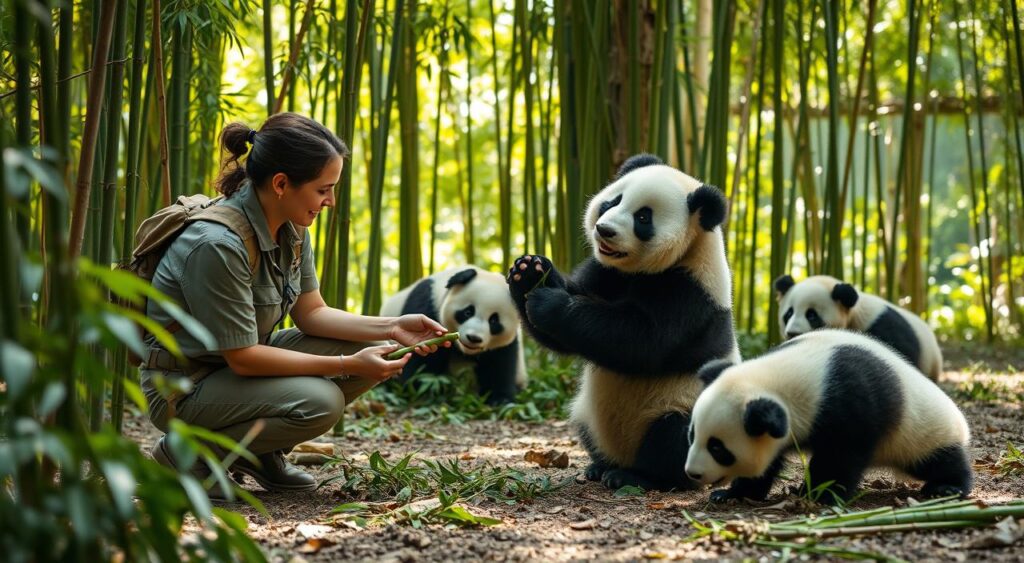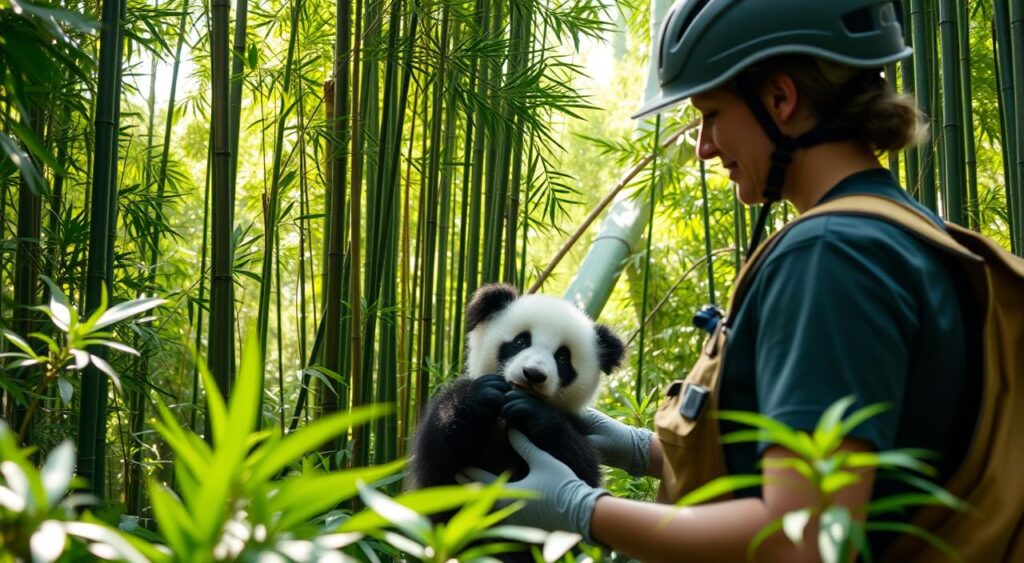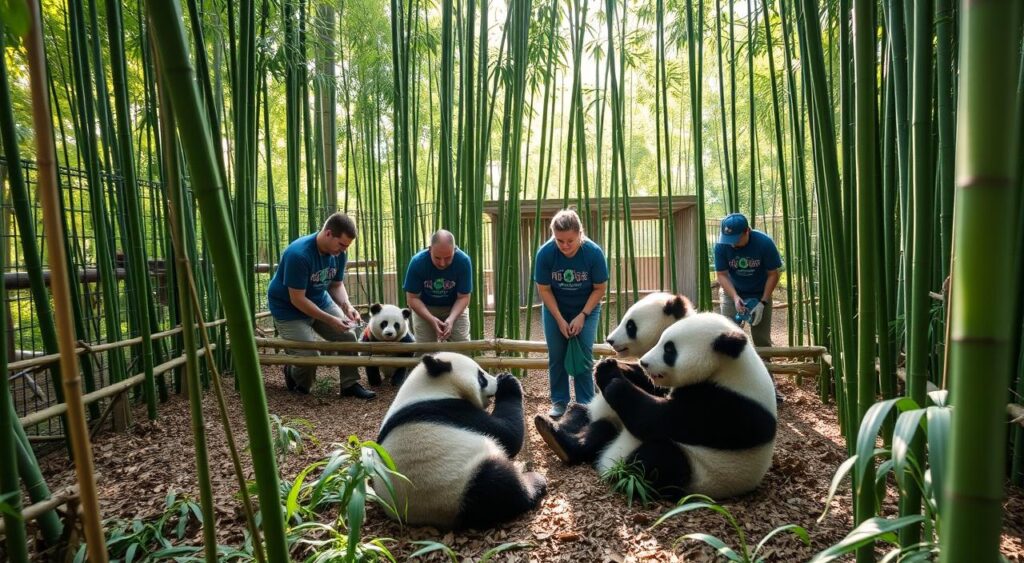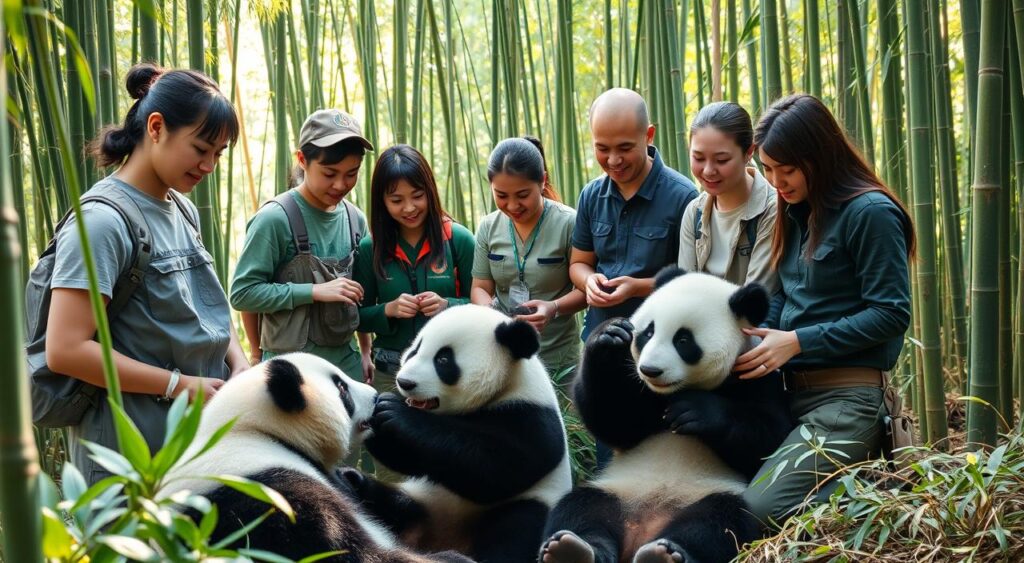Volunteer Programs in Panda Conservation: In China’s Sichuan province, a big effort is happening to save the giant panda. Volunteer programs are key in this fight. They give people a chance to help protect and care for these endangered animals. Places like the Bifengxia Panda Base and the Wolong Panda Center are leading this effort.
Volunteers help with important tasks like making food, cleaning enclosures, and doing research. These tasks are crucial for keeping the panda population safe. By working with experts, volunteers learn a lot about panda conservation. They also make a real difference in the lives of these amazing animals.
Key Takeaways
- Volunteer programs offer unique opportunities to work directly with endangered giant pandas in China’s Sichuan province.
- These programs operate at several renowned panda conservation sites, including the Bifengxia Panda Base, Wolong Panda Center, and Dujiangyan Panda Base.
- Volunteers contribute to essential tasks such as food preparation, enclosure cleaning, and research activities to support panda survival and wellbeing.
- By participating in these programs, volunteers can make a meaningful difference in protecting the giant panda and its fragile habitat.
- Volunteer programs provide valuable opportunities to learn about the complexities of panda conservation and become part of the ongoing efforts to safeguard this iconic species.
Introduction to Panda Conservation Volunteering
Giant pandas are a symbol of conservation efforts worldwide. They face threats from habitat loss and human activities. With only 1,800 pandas left in the wild, their survival is key to their ecosystems.
Panda conservation volunteering offers a chance to help protect these animals and their homes. It also helps volunteers understand the importance of conservation and the natural world’s diversity.
Importance of Conserving Giant Pandas
Giant pandas are crucial to their ecosystems. As endangered species, they face threats like habitat loss and human-wildlife conflict. Protecting pandas and their habitats is vital for ecosystem health and diversity.
Overview of Volunteer Opportunities
In China, panda conservation volunteering programs are available. They are mainly in the Sichuan province, with the Chengdu Research Base being the largest. However, only three bases accept volunteers.
Volunteers help with tasks like food preparation, enclosure cleaning, and research. This supports the pandas’ conservation and well-being.
| Duration | Volunteer Experience | Cost Considerations |
|---|---|---|
| One day | Ideal for a brief introduction to panda conservation | Relatively lower cost |
| One week | Offers a more immersive experience, allowing for a deeper connection with the pandas | Higher than one-day programs |
| Up to one month | Cater to participants with a strong commitment to panda conservation | Highest among the duration options |
The Panda Conservation Project is supported by the Chinese government and WWF. It houses 80 pandas on 76 hectares. Volunteers help with feeding, cleaning, and medical care.
Volunteers also observe animal behavior, assist with maintenance, and give tours. They help with administration tasks like data entry and marketing.
The program is near Chengdu, the capital of Sichuan Province. It’s home to over 14 million people and has mountains over 3,000 meters high.
Volunteers don’t need special skills, but must be mature and interested in animal conservation. Medical requirements apply.
Volunteer Programs in Panda Conservation

Bifengxia Panda Base
The Bifengxia Panda Base is in the beautiful Bifengxia mountain range of Sichuan province. It’s a top spot for panda conservation volunteers. The base covers nearly 400 hectares and has 58 panda enclosures. A team of 144 panda staff takes care of it.
Volunteers help with feeding, cleaning, and research. Their work supports the conservation of these endangered animals and their habitats.
Wolong Panda Center at Gengda
The Wolong Panda Center at Gengda is in the Wolong Nature Reserve. It’s the biggest panda breeding center worldwide. The center helps sick, injured, and old pandas.
In 2008, an earthquake hit the original center. Now, it’s rebuilt in Gengda. Panda volunteers help with food, cleaning, and research.
Dujiangyan Panda Base and Center for Disease Control
The Dujiangyan Panda Base is near Chengdu in Sichuan province. It’s on 126 hectares. The base focuses on rehabilitating sick, injured, and old pandas.
Panda volunteers prepare food, clean enclosures, and help with research. Their work supports the health and conservation of the giant pandas.
| Panda Base | Location | Panda Population | Volunteer Capacity |
|---|---|---|---|
| Bifengxia Panda Base | Sichuan Province | Over 40 pandas | Up to 40 volunteers at one time |
| Wolong Panda Center at Gengda | Wolong Nature Reserve, Sichuan Province | Over 30 pandas | No specific capacity given |
| Dujiangyan Panda Base and Center for Disease Control | Chengdu, Sichuan Province | Unknown | Up to 50 volunteers at one time |
“Pandas do not develop aggression until the age of two or three years old, making them ideal candidates for panda volunteer programs.”
How to Choose the Right Panda Volunteer Program

When picking a panda volunteer program, it’s important to do your homework. Look at program reviews online, the quality of where you’ll stay and eat, and the program costs.
Most panda volunteer spots are in China’s Bifengxia, Gengda, or Dujiangyan areas. Most programs are at the Bifengxia Panda Base. Prices can range, with about $100 a day on average.
Make sure you have good travel insurance before going. It will help keep you safe and worry-free in Chengdu, Bifengxia, Gengda, or Dujiangyan.
Evaluating Program Reviews and Costs
- Look up online panda volunteer program reviews to see how good they are.
- Check the program costs for things like where you’ll stay, eat, and travel.
- Make sure the volunteer housing and volunteer food are what you expect.
- See if there are any extra panda activities or photo chances, which might cost more.
| Program | Average Cost per Day | Included Amenities |
|---|---|---|
| Bifengxia Panda Base | $100 | Accommodation, Meals, Uniform, Transportation |
| Wolong Panda Center at Gengda | $105 | Accommodation, Meals, Uniform, Transportation |
| Dujiangyan Panda Base and Center for Disease Control | $95 | Accommodation, Meals, Uniform, Transportation |
“Choosing the right panda volunteer program is crucial for a rewarding and fulfilling experience.”
Health and Safety Considerations

Volunteering with pandas is usually safe because they are calm and gentle. But, it’s key to have travel insurance ready for any unexpected events in Chengdu, China.
Volunteer groups usually take care of safe accommodations and transport. There are no hard health requirements except for being ready to do some physical tasks. Following the panda staff’s advice and being careful, you can have a great time helping these amazing animals.
It’s vital to remember that mishandling or provoking a panda can be very dangerous for both the panda and the volunteers. Conservation efforts in China, like habitat work and breeding programs, help understand pandas better. This ensures everyone’s safety.
Even though panda volunteer safety is a big deal, you should also get ready for the physical work. This includes carrying heavy bamboo and cleaning. Knowing how to handle pandas safely is crucial for a good volunteer experience.
| Key Considerations | Details |
|---|---|
| Travel Insurance | Ensure adequate coverage in case of any unforeseen incidents during the volunteer program. |
| Accommodations | Volunteer organizations typically arrange for safe and comfortable volunteer accommodations in Chengdu. |
| Health Requirements | No strenuous health requirements beyond a willingness to engage in physical tasks such as cleaning enclosures and carrying bamboo. |
| Panda Handling | Proper techniques and safety protocols are essential to ensure the well-being of both the pandas and the volunteers. |
By focusing on safety and listening to panda keepers, volunteers can have a fulfilling experience. They help with important panda conservation work.
Responsibilities and Tasks of Panda Volunteers

Panda volunteers are key in helping with daily tasks and conservation at China’s panda bases. They chop and distribute bamboo, the pandas’ main food. They also clean the pandas’ homes and carry fresh bamboo to them. Plus, they help with research and care for the pandas, guided by the panda staff.
Preparing Food for Pandas
Feeding the giant pandas is a big job for volunteers. They cut and arrange bamboo, the pandas’ main food. Volunteers make sure the pandas get the right food and amount to stay healthy and full of energy.
Cleaning Enclosures and Carrying Bamboo
Volunteers also keep the pandas’ homes clean and tidy. They sweep, mop, and disinfect to keep the pandas comfortable. They also carry fresh bamboo to the pandas, which is a big part of their diet.
Doing these tasks can get messy, but it’s worth it to work with these amazing animals. Volunteers help care for the pandas and protect them, with the help of the panda staff.
Volunteer Programs in Panda Conservation

People wanting to help with panda conservation need to meet certain requirements. They should have a background in biology, zoology, or a related field. Also, having experience with animals, like in zoos or shelters, is helpful.
Knowing Mandarin is a big plus. Many panda projects are in China, and speaking the language helps a lot. Some programs might ask for special certifications or licenses. These show you know how to care for pandas.
| Requirement | Details |
|---|---|
| Educational Background | A degree in biology, zoology, or a related field is often preferred. |
| Animal Experience | Prior experience working with animals, such as in zoos, shelters, or rehabilitation centers, is highly valuable. |
| Language Skills | Proficiency in Mandarin is a significant advantage, as many panda conservation programs are based in China. |
| Certifications | Some programs may require volunteers to obtain specific certifications or licenses, such as those issued by the China Conservation and Research Center for the Giant Panda or the Association of Zoos and Aquariums (AZA). |
By meeting these requirements, you show you’re serious about helping pandas. This makes you a strong candidate for these important roles.
Becoming a Panda Nanny: A Rewarding Career

Working as a panda nanny is a special and rewarding job for those who love animals. Panda nannies take care of pandas in captivity. They help with important conservation work.
Educational Background and Experience
To be a panda nanny, you need a degree in biology, zoology, or wildlife biology. This helps you understand pandas well. Also, having experience with animals is very helpful for this job.
Language Skills and Certification
Panda nannies must speak Mandarin because pandas are from China. They need to communicate well with Chinese staff. They also need special certifications to work with pandas.
These certifications show they know a lot about pandas. They are given by the China Conservation and Research Center for the Giant Panda or the Association of Zoos and Aquariums (AZA). This ensures they can care for pandas well.
“As a panda nanny, I have the privilege of caring for these incredible creatures and contributing to their conservation. It’s a truly rewarding experience that requires a deep understanding of panda biology and behavior, as well as a passion for protecting endangered species.”
– Jane Doe, Certified Panda Nanny at the China Conservation and Research Center for the Giant Panda
Also Read: How Can Technology Enhance Cultural Conservation In Eco-Tourism For panda?
Conclusion
Volunteer programs in panda conservation give people a chance to really help protect these amazing animals. By joining these efforts, volunteers help with the daily care and conservation efforts of giant pandas. Places like the Bifengxia Panda Base, Wolong Panda Center at Gengda, and Dujiangyan Panda Base are where this happens.
Volunteers do important work like panda care, panda research, and panda protection. They play a big part in keeping the panda population and their homes safe. For those who love animals and want to help, panda volunteering is a fulfilling way to make a difference.
These volunteer programs are key in saving the pandas for the future. They offer a chance to connect with China’s culture and nature. Volunteers can make a big impact on these incredible animals and help ensure their legacy lives on.
FAQs
Q: What opportunities are available to volunteer with pandas in China?
A: There are various volunteer programs where you can volunteer with pandas in China, particularly at locations like the Wolong Panda Base and the Chengdu Research Base of Giant Panda Breeding. These programs typically involve tasks such as preparing food for the pandas, cleaning their enclosures, and assisting with panda care and research.
Q: What is the Wolong Panda Base?
A: The Wolong Panda Base, located in Sichuan province, is one of the largest and most renowned panda sanctuaries dedicated to the conservation of giant pandas. It is known for its efforts in giant panda breeding and rehabilitation, and it offers a unique volunteer experience for those interested in working with these endangered species.
Q: How can I participate in a panda volunteer program in Chengdu?
A: To participate in a panda volunteer program in Chengdu, you can sign up through various organizations that offer such experiences. These programs typically include hands-on activities at the Chengdu Research Base of Giant Panda Breeding or the Ya’an Bifengxia Panda Base, where you can spend time with the pandas and learn about their conservation.
Q: What kind of volunteer work can I expect at the panda sanctuaries?
A: Volunteer work at panda sanctuaries often includes preparing food for the pandas, cleaning their habitats, observing their behavior, and participating in educational sessions about giant panda conservation. Volunteers may also have the opportunity to interact with the pandas and gain insight into their daily care.
Q: Can I experience time with the pandas at the Wolong Shenshuping Panda Base?
A: Yes, the Wolong Shenshuping Panda Base offers volunteer programs where participants can spend time with the pandas. Volunteers typically engage in activities that support animal care, and the experience is designed to educate participants about giant panda conservation efforts.
Q: What are the requirements to volunteer at a panda base?
A: Most panda bases require volunteers to be at least 16 years old, though some programs may have a minimum age of 18. Additionally, participants should have a love for animals, be in good physical health, and be ready to work in various weather conditions. Some programs may also require a fee to cover accommodation and meals.
Q: What is the significance of the giant panda in conservation efforts?
A: The giant panda is a symbol of wildlife conservation worldwide. Efforts to protect pandas in China focus on habitat preservation, breeding programs, and raising awareness about the importance of biodiversity. By volunteering with pandas, individuals contribute to these vital conservation efforts and help protect this endangered species.
Q: Are there any specific activities that involve red pandas during the volunteer experience?
A: While many volunteer programs focus primarily on giant pandas, some may offer opportunities to interact with red pandas as well. Activities may include observing their behavior, feeding them, and learning about their care and habitat needs as part of the broader conservation efforts.
Q: How do I prepare for a panda volunteer experience?
A: To prepare for a panda volunteer experience, it’s essential to research the specific program you will be participating in. Bring comfortable clothing suitable for outdoor work, closed-toe shoes, and any personal items you may need. Familiarizing yourself with panda care and conservation can also enhance your experience.

